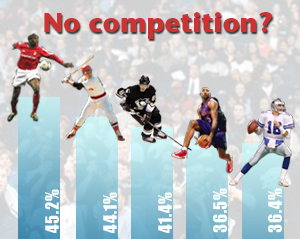What is less than super about the Super Bowl
Statistics show that when it comes to competition, football loses

Got any plans for Sunday, say around 6 p.m.? Chances are pretty good that along with about 90 million Americans, you will be watching Super Bowl XL, between the Seattle Seahawks and the Pittsburgh Steelers. The Super Bowl is perennially one of American television’s biggest draws, this year fetching ABC a record $2.5 million for every 30 seconds of advertising. What explains such massive allure? According to a study by Sidney Redner, a College of Arts and Sciences physics professor, it’s probably not the competition.
Redner and colleagues Federico Vazquez, a GRS physics grad student, and researcher Eli Ben-Naim of the Los Alamos National Laboratory crunched a century’s worth of numbers, more than 300,000 games from the National Football League, the National Basketball Association, Major League Baseball, the National Hockey League, and the English Premier League (soccer), to determine the relative competitiveness of each sport. The researchers based the notion of competitiveness on the probability of an upset victory by the team with a lesser record of wins and losses. And when it comes to this measure of competitiveness, it turns out, the NFL comes up a loser, with a 36.4 percent chance of an upset in any given game. Soccer was the most competitive sport, with the underdog pulling off a victory 45.2 percent of the time.
Redner, a statistical and theoretical physicist, often studies complex systems outside of mainstream physics. In this case, he and his colleagues were using sports statistics to test a model they developed to approximate competition in another complex system: society, specifically social stratification. Put simply, if class structure could be thought of as the result of millions of competitions between individuals, then adjusting the frequency and upset probability of these competitions would result in more or less egalitarian societies.
“We were not driven by sports questions; we were driven entirely by statistics,” Redner says. Indeed, sports holds little interest for Redner except as a source of statistics and as the occasional metaphor. “This sports study was sort of an off-the-wall project of something that was already out in left field,” he explains.
But this is the Super Bowl we’re talking about, not some run-of-the-mill Sunday gridiron matchup. Surely that should ratchet up the competitiveness, right? Well, not exactly. Statistics remind us that there have been only 11 upsets in Super Bowl history, meaning the big game defies the oddsmakers only 28 percent of the time.
Yeah, well, you can bet the Rolling Stones won’t be performing at any World Cup halftime shows.